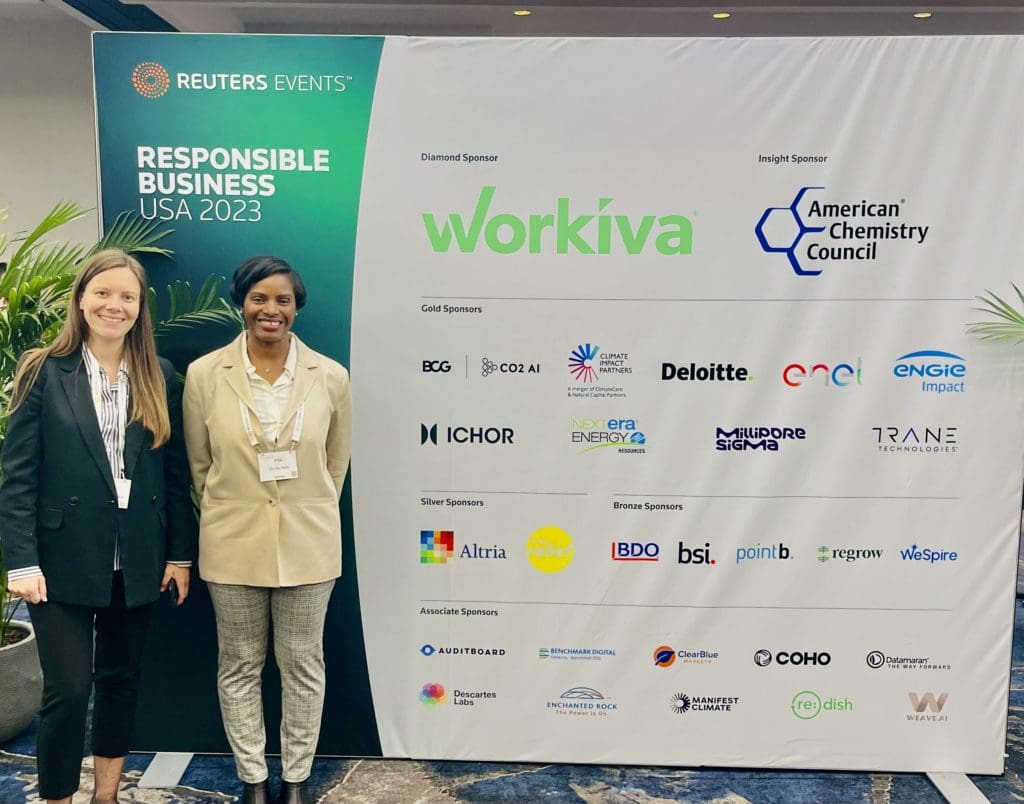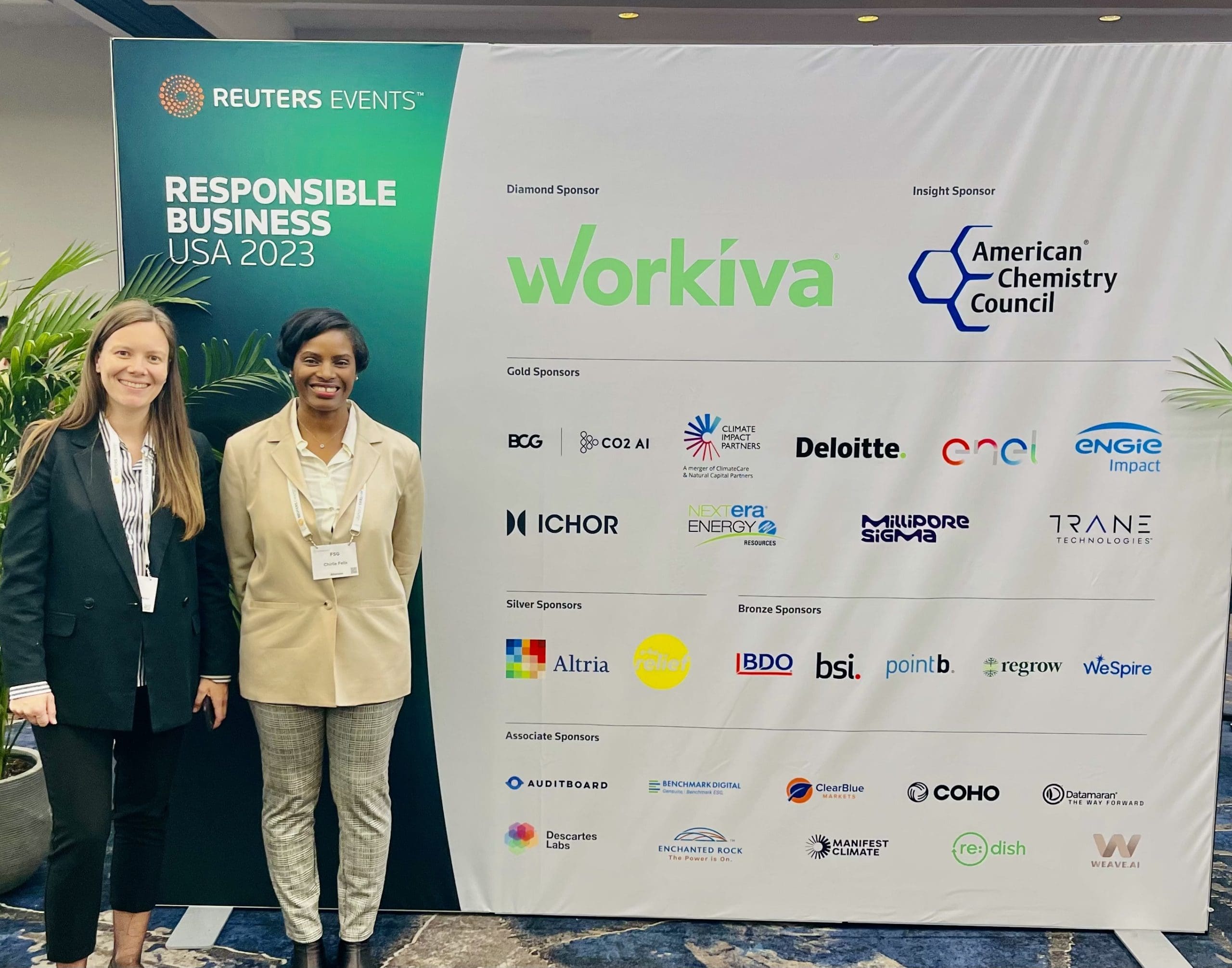
FSG director Lolita Castrique-Meier and managing director Chirlie Felix at the Reuters Responsible Business USA 2023 event in New York.
There has never been a more dynamic time for sustainability and social impact leaders within corporations. In the face of looming regulation, businesses around the world are increasingly engaged in developing effective ESG strategies. Thus far, companies have been mostly focused on complying with “environmental regulations” as businesses seek to ensure long-term change and a realistic path to net zero. While this focus is important, the greater opportunity is for companies who see ESG as an opportunity for value creation and who pursue the “social” with as much intensity as they pursue environmental and governance topics.
At the Reuters Responsible Business USA 2023 event in New York last month, we joined sustainability practitioners from some of the world’s leading companies including Colgate, Mastercard, Ford, Enel, Intel, and more to discuss how they are seeking to embed sustainability across their enterprises. In the words of one panelist, sustainability is no longer a vertical, but instead it is the hub of the business. From investing in renewable energy and reducing waste to promoting ethical and equitable supply chain practices, companies are prioritizing ESG in order to create a positive impact on the environment and communities and build trust with all of their stakeholders.
With the possible adoption of new SEC regulations and what we are learning from the EU Sustainable Finance Disclosure Regulations, we believe that ESG is set to become an even more critical component of corporate strategy. Sustainability leaders who want to be well positioned for long-term success and corporate strategy should see ESG as an opportunity for creating value, not simply complying with reporting requirements. Savvy leaders will:
1. Treat ESG as a business and social impact opportunity, and not just a risk to be managed
As we look ahead, it’s clear that companies that view ESG from a business perspective will be better positioned for long-term success and future value creation. This will require:
- Shifting ESG integration within companies from “checking boxes” to actively identifying ways to create positive social and environmental impact through a business-oriented ESG strategy.
- Repositioning sustainability as a core component of business growth and expanding companies’ definition of performance to encompass both financial and societal performance and demonstrating that environmental sustainability and social impact can have a positive impact on long-term value creation.
- Helping employees, consumers, and suppliers understand the costs and benefits of focusing on ESG. Liliana Esposito, chief communications officer at Wendy’s, discussed the importance of leveraging data to help make the case to employees—and franchisees—of science-based targets. Through their Go Sustainable Energy Program, Wendy’s is helping to slowly change energy practices for franchisees by benchmarking utilities usage and unlocking the case for setting science-based targets.
2. Help usher in a just transition for all by focusing on people who are most impacted, beyond technical solutions
Companies are deeply committed and focused on developing a clear roadmap and path to net-zero emissions; however we saw opportunities for companies to do more to integrate equity into these conversations more explicitly. This includes:
- Focusing on creating green jobs and supporting those who are historically marginalized with education, training, and upskilling opportunities for these jobs.
- Ensuring that ESG, corporate philanthropy, and CSR are tied together and that the company is helping to bring direct resources, grants, and opportunities to underfunded and under-resourced communities and populations.
- Ensuring that the ESG and DEI leaders and teams within their companies are developing complementary strategies and working together.
3. Engage with the “S” as robustly as they commit to the “E”
In the environmental, social, and governance components that make up ESG, companies must engage with the social (‘S”) component as robustly as they are committing to the environmental (“E”) component. In particular, we are noticing the following trends:
- Due to the evolving regulatory ESG landscape, companies are putting particular emphasis on the environment. In particular, they are focused on defining how to meet upcoming reporting requirements, especially those that concern value chain emissions (“Scope 3” emissions).
- Next to this push on the “E,” the “S” of ESG doesn’t seem to be material, perhaps because social impact is perceived as less measurable or clear. Too often, companies lack clarity about which pieces of the “S” are most important and material for a company’s business success.
- Within companies’ sustainability efforts, the “S” ambitions and efforts are most often fragmented between philanthropy, CSR, DEI efforts, and philanthropic initiatives and are seldom positioned as business opportunities.
4. Integrate sustainability firm-wide through thoughtful operationalization
To further integrate business and sustainability within their organizations, smart companies are:
- Redefining roles and responsibilities as corporate functions are transformed or reassigned to give life to companies’ sustainability commitments. We heard a lot of recognition that everyone in the company has a role to play, although it looks different for various corporate leaders roles:
- CFOs, CSOs, and ESG leads must provide expertise to help ensure that sustainability considerations are prioritized in decision-making processes and reporting. CFOs and CSOs both play a critical role in ensuring that sustainability objectives are fully integrated into their companies financial and strategic planning. Colgate’s CFO Stanley J. Sutula III and chief sustainability officer Ann Tracy discussed on stage how they collaborate closely to embed sustainability as a core component of growth and risk management at Colgate. While the distribution of roles and responsibilities is becoming clearer, there is still considerable uncertainty about how to change the culture, practices and do the work.
- Functional leaders are tasked to translate companies’ commitments into concrete business practices and daily operations. They need to deeply understand the company’s ambitions in order to identify what they can transform in their operations, commercial and business practices. This requires a complete shift in paradigm from being purely focused on measuring business KPIs to being accountable for the company’s sustainability commitments.
- Revisiting how employees are engaged in their company’s sustainability journey and developing sustainability champions across the workforce. This means making sure employees understand the role they play in achieving firm-wide sustainability objectives, are clear on what needs to/will change in their day to day job as a result, and are being equipped with needed skills/knowledge to support their company’s integration of sustainability and business ambitions.
- Breaking silos between different parts of the company in order to align on business and societal ambitions. Smart leaders are examining how each part of the company, from philanthropy, to commercial divisions, contribute toward the same goals.
- Making the business case for greater transformation. To get buy-in for deeper transformation within companies, creative leaders will strengthen the business case for sustainability, quantifying risks and benefits that embed sustainability throughout the business to create a compelling case for various audiences, including investors and company key decision makers (executive leadership teams).
We look forward to connecting and learning with corporate sustainability leaders who are interested in integrating their sustainability goals with their business objectives and into their company’s operations and culture.
To get in touch with our team and explore how to embed social impact considerations into your company’s ESG strategy, please fill in this quick form:

